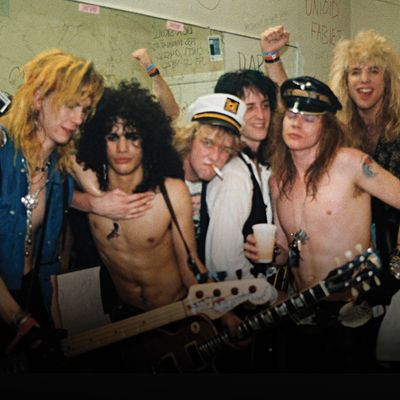
With the classic Guns N’ Roses lineup (well, most of it) reupping for Coachella, it’s easy to get swept up in nostalgia for the band’s prime — unless you remember actually dealing with Axl Rose, Slash, Duff McKagan & Co. Here’s what it was like to be caught in the middle of the GNR whirlwind.
November 22, 1987, Omni Coliseum, Atlanta
As concert promoter Charlie Brusco walked through the back door of the arena shortly after the concert started, he knew something was wrong. “I heard this horrible sound,” Brusco says. “I look up, and one of the guys in the road crew was singing.” A roadie for the band named Big Ron was on lead vocals, because, earlier, Rose had jumped offstage, punched a cop, and been carried away. The Omni’s head of security told Brusco, “First strike, he hit an Atlanta police officer. Second strike, he hit a female Atlanta police officer. Third strike, he hit a black female Atlanta police officer. He’s going to jail.” Brusco begged for Rose to be allowed to finish the show. Finally the security chief said, “If he apologizes to the police officer in writing, we’ll let him go.” Brusco agreed. He was led to Rose, who was sitting at a makeshift booking table wearing his trademark bandanna. Rose dutifully signed his apology, and security brought in the female officer. Then Rose looked up and said, “Fuck you, you fucking jag-off cop.” He was hauled to jail, and the show was canceled. “I don’t think,” Brusco says, “I did another Guns show after that.”
February 12, 1988, Celebrity Theatre, Phoenix
On the night of this gig, promoter Danny Zelisko was attending a roast for a colleague across town when he got a call from the venue. “Man, you better get down here right away,” Zelisko recalls the manager telling him. “This place is going to explode.” Because the show was rocking? Nope. The audience was raging because, Zelisko explains, “the opening act had been on for 90 minutes and Axl wouldn’t come out of his hotel room.” The crowd got so unruly that the city’s riot squad showed up outside the theater.
Inside, Zelisko huddled with Alan Niven, GNR’s then-manager, and asked, “Does Axl do this often?” Niven replied, “Nah, not really, but tonight he’s not going to come.” Zelisko wondered, “How are we going to get out of this building alive?” He turned to Niven: “You have a nice British accent. You make the announcement. I’m not getting torched.” Niven did, saying that Rose had “throat problems.” After some tense moments, the crowd dispersed peacefully. As a make-good, the band agreed to return to play a benefit show later in the year. “I said, ‘You guys have to come the day before the show,’ ” recounts Zelisko, “ ‘and come to my house for a BBQ so I know you’re in town and not acting up.’ ” Everyone appeared, except Axl. (Who, to his credit, did play the rescheduled concert.)
April 29, 1988, Coronado Theatre, Rockford, Illinois
Andy Cirzan was a talent buyer for the live-entertainment company Jam Productions when he was assigned to accompany GNR to a gig in Rockford, Illinois. “The guys at the venue,” says Cirzan, now a VP at Jam, “told me, ‘We got this call from the Iowa state police; they wanna talk to the band members about incidents that transpired at a show.’ ” Cirzan is mum on what, exactly, those “incidents” were, though in 1990 the Chicago Reader alleged that police searched the band’s tour bus for videotapes of underage women. Cirzan says, “I remember thinking, Jesus, what have I gotten into? I called the venue owners and asked, ‘What do we do if a band member gets arrested?’ ” The cops never showed, and Cirzan went to go check on the band. He saw lead guitarist Slash “lying on a cot with a rigor-mortis grip, his arms around a bottle of Jack Daniel’s. I figured, Okay, one guitar player down.” When the band did make it onstage, Slash (he’d rallied) allegedly said to the crowd, “Tell the fucking pigs that I’m going to do whatever I fucking please.”
December 6, 2002, First Union Center, Philadelphia
When the band (now Axl and a bunch of ringers) returned after an eight-year layoff, its front man had hardly mellowed. At this gig, Larry Magid, one of the promoters for GNR’s Philly tour stop, started to worry when Mix Master Mike’s opening set went on well beyond its scheduled last song. “The managers weren’t able to persuade the band to go on,” recalls Magid. “Whatever psychological issues Axl was having, he just couldn’t get onstage.” By 9:30, Mike was finished, but GNR still hadn’t shown; near midnight, an announcer declared the band would not be performing. (The rumor was that Rose was in New York watching basketball on TV.) “The audience responded,” Magid says, “by wrecking the place — almost $200,000 in damages.” As the Philly papers reported, fans threw bottles, chairs, and (somehow) ceiling tiles. “They’re not my favorite band,” says Magid. Things were bad outside the arena, too: In the parking lot, somebody threw a trash can through a Toyota Camry’s windshield. “I did one show with them, and that’s all I wanted to do,” Magid says. “Why would you subject yourself to the promise of more punishment?”
GNR headline the Coachella festival on April 16 and 23.
*This article appears in the March 21, 2016 issue of New York Magazine.




